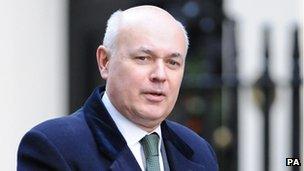Duncan Smith rejects claims on cancer benefit changes
- Published

Iain Duncan Smith is spearheading the government's welfare changes
Iain Duncan Smith has rejected suggestions that thousands of cancer patients could lose nearly £100 a week due to coalition welfare changes.
Macmillan Cancer Support has claimed that changes to employment support allowance would leave 7,000 people who are unable to work £94 a week poorer.
But the work and pensions secretary told the BBC this was "not correct" and most people "will not be touched".
Labour said support should be given to those who "desperately need it".
Proposals in the government's welfare reform bill will mean many of those receiving the contributory element of employment and support allowance (ESA) - formerly known as incapacity benefit - will no longer automatically receive it after 12 months.
Charities' criticism
Those considered able to work some time in the future, including cancer patients, will be means-tested.
The government has insisted it will proceed with the changes - thought likely to save £2bn a year - despite criticism from charities and opposition in the House of Lords.
Peers rejected the proposals last week and said people should automatically get the benefit for two years, not one.
There are two types of ESA - a contributory element, for those who have paid a certain amount of National Insurance, currently paid regardless of savings or other income - and income-related ESA, paid to those with little income and savings.
Mr Duncan Smith told BBC Two's Daily Politics that those who had savings of more than £16,000 would be expected to "dip into" their own money to support themselves after a year, as taxpayers needed to know that state support for those with a certain level of income was not "open-ended".
He said when savings reached £10,000, people would start to get the income-related ESA instead.
'Sliding scale'
And he stressed that all those judged too ill to work would automatically receive the benefit.
"The key point is I think it is right after a year of which you have received a benefit for which you contributed we ask you to use some of your savings because the taxpayer simply cannot go on paying money to people who have savings and do not want to use them," he said.
"Bear in mind that the average savings for British families are £450. Most people will not be touched by this. In regards to this, we have done everything that Macmillan have asked of us.
"Where we dispute their figures is that there is a sliding scale even if they have savings.
"As you reduce those savings, you go onto the income-related benefit."
But shadow health secretary Andy Burnham said the public were concerned about the change and did not support moves to "take help away from people who desperately need it".
Addressing Mr Duncan Smith, he added: "You are a man of compassion and integrity. How can you possibly take employment and support allowance from people recovering from cancer? You cannot put a time limit on cancer.
"People recover at a different length. They have got all the pressure and all of the stress that comes from that condition. How can you give them the extra worry of worrying about their benefits?"
Macmillan has said people should not be "penalised" because they take longer to recover from treatment and there should be no time limit on people returning to work after illness.
'Robust'
Paralympian questions welfare minister over DLA changes
Mr Duncan Smith also defended the government's decision to reassess all those receiving disability living allowance and to replace it with a new personal independence payment (PIP), which will be subject to regular reassessments.
Campaigners have said 500,000 vulnerable people will lose the benefit but Mr Duncan Smith said not all of these were "necessarily" entitled to it and should rather be getting support from other areas.
"The criteria will be re-examined," he added. "If their (people's) condition changes, they will fall out. If it gets worse, they will get a higher level of payment."
The government saw off an attempt by crossbench and Labour peers on Tuesday to delay the process by ensuring it was introduced on a pilot basis.
Mr Duncan Smith suggested the system was being undermined by the perception that some people were getting the benefit who were not entitled to it.
"What PIP will do is be able to say to taxpayers 'look we have got a system here which is very robust, which will give to people who need it the right money and now you can respect that benefit."
- Published17 January 2012
- Published12 January 2012
- Published11 January 2012